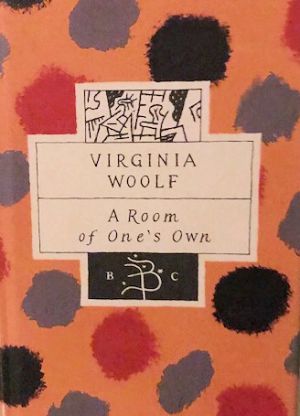Great challenge
Ginny - but nothing beginning with 'two' comes immediately to mind, I will have to think about that one!
I have finally located my copy of
A Room of One's Own - I have sent a photo of it to Ginny to see if she would very kindly insert it into this post, as it is a nice Bloomsbury Classics copy.

A twitter friend and reviewer is re-reading
To the Lighthouse, so I asked her about
A Room of One's Own (as this will be a re-read for me). She said she recalled, as I do, reading it as a teenager and feeling very militant about the issues it raises - but when she re-read it (as a 50+ woman) she found parts of it quite funny. I wonder how I will feel about it after all these years - it's interesting to note how our reactions to books can change as we live our lives, isn't it?
I am reading
Murder in Mesopotamia for the #1936Club. It's a long time since I've read any Agatha Christie, and I must say I am struck by all the snobbery, racism, sexism and really everything-ism. But I remind myself this was published 80+ years ago. I also found my copy of South Riding, which also qualifies. I'd like to read it, as I've seen two very good TV adaptations over the years, but it's long, so i thought I'd get the Christie under my belt then see how I am doing before turning to Winifred. She, of course, had very different political leanings from Agatha.
I've just read
Business As Usual by Jane Oliver, which was first published in 1933 (not 1936, inconveniently) and has been republished by Handheld Press. It's about a girl who, having garduated from university, returns to her parents' home in Edinburgh. She is engaged to be married to Basil, a very proper and, as we realise over the course of the book, rather pompous. surgeon. She decides that before she marries she wants to spend a year in London earning her own money, so she takes herself off on the train, and eventually gets employed at Everyman's, (really Selfridges), in their book shop and lending library - in those days many large stores had libraries, and posted books out to their members. In this store there are three classes of membership, A, B & C, according to price, and those who are in the lowliest group only get dog-eared and sometimes stained copies, whereas those in the top one get all the lovely new hardback editions.
The entire story is told in letters - from Hilary to her fiance and her parents - and memos between various members of staff. The letters from disgruntled titled ladies and crusty colonels complainng about the books they have been sent are very entertaining.
It does give an insight into working life on the other side of the counter in a department store at the peak of its success, and also shows the struggles of the underpaid workers, who live in dingy basement flats, or at home with their parents.
Of course the thing I found irritating about the whole thing was that Hilary is really only playing at being a worker - although she does indeed stay in a very depressing flat for a while, she always knows she can go home at any time, and that she will be married to a wealthy man at the end of the year. And her frequent assertions that her family is 'poor' are of course very middle class and relative - some of her family are aristocrats, and she is wined and dined by Great Aunt (Lady) Bertha, who sends round lovely furniture (from the store itself) when she sees what Hilary is living with. Hilary is also invited to smart weekend parties at other relations' country piles.
In the end Hilary's life turns out rather differently from how she had thought it would, but the ending is of course happy.
It's a fun book, and interesting, but not one to be taken too seriously. The depiction of the library back room, with all its staff hirearchies and petty squabbles, is the best bit, and I'm not sure that offices are really any different today.
I've also listened to Stella Gibbons' novel
Westwood and Dodie Smith's play
Dear Octopus (first staged in the war) on BBC Sounds, and enjoyed both.
And we are finally watching
The Crown on Netflix! We're just up to the time of the Princess Margaret/Peter Townsend affair. It does show you just how difficult the Queen's position was, and how dreadful the Queen Mother and the palace aides could be. The QM does not come out of it at all well - by the time of my childhood she seemed to be just a cheery old lady, but my mother confirms that she was, when younger, dreadful. I wonder if, had Margaret been allowed to marry Townsend, she would have settled down and lived a 'normal' upper class life, or whether she was just the kind of person who had to have constant excitement, so would have been wayward whatever happened? Claire Foy is just wonderful, isn't she? So much conveyed in just a glance (as it was when she was playing Anne Boleyn in
Wolf Hall.)
Right, back to thinking about titles beginning with Two....are there any?!
Rosemary